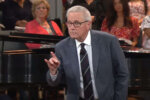Read time: 5 minutes 21 seconds
There are numerous viewpoints from a wide variety of writers on why people should receive the baptism with the Holy Spirit as confirmed by speaking in tongues. When we genuinely engage scripture, we see supporting evidence of the command to receive it. It is impossible to disentangle or separate speaking in tongues from worship and Christian experience in general.
P. C. Nelson, one of the “Generals” of the Pentecostal Movement, points out in “The Baptism in the Spirit” that many believers, experiencing the joy of receiving the baptism in the Spirit, decide that this baptism is a luxury, an added benefit, rather than a necessity (Nelson, 41). The Word of God, however, emphasizes the necessity of this experience. Jesus commanded His disciples to tarry until they were endued with power from on high (Luke 24:49).
Nelson gives several reasons why believers should receive the baptism with the Holy Spirit. The importance of this can be seen from the following points, taken from “The Baptism in the Spirit” by P.C. Nelson (41-48).
1. Jesus Himself was anointed with the Spirit before He began His public ministry (Matt. 3:16), and after He began His ministry (Acts 10:38). It was through this anointing that Jesus preached, healed the sick, and cast out demons (Matt. 12:28); and offered Himself to God as an atonement for the sins of the world (Heb. 9:14). The anointing Spirit quickened Him from the dead (Rom. 8:11). “If the Holy Son of God needed the anointing of the Spirit for His ministry, what supreme folly to imagine that we can dispense with it” (Nelson, 43).
2. The Holy Spirit is our Advocate. This Advocate was to take Jesus’ place in the disciples’ lives. He was to be more to them than Jesus had been. Jesus said that it was for the disciples’ benefit that He go away and send the Advocate to them (John 14:15-17). The disciples could not receive the Spirit in fullness until Jesus had ascended. Nelson states, “Amazing that the almighty Holy Spirit—should come down from the Father and make His abode in each believer, teaching, guiding, inspiring, helping us just at the moment, and in the way most needed” (44).
3. Without the aid of the Holy Spirit we are spiritually inadequate. We need the Holy Spirit to help us pray (Rom. 8:26-27), and to be effective witnesses (Acts 1:8). All Christians need the Holy Spirit to be able to bear fruit for Christ (John 15). The Holy Spirit makes Christ real to believers and allows Christ to be effective in their lives. “Christ dwelling in our hearts by faith through the mediation of the Holy Spirit will make our lives fruitful unto every good work and the fruit of the Spirit will appear” (Nelson, 46).
4. Without the Holy Spirit we cannot worship God acceptably. Worship that is not inspired by the Holy Spirit is empty, mechanical, and meaningless (John 4:23). P. C. Nelson states:
“How hard it is for hearts and lips untouched by the Holy Spirit to glorify Christ! How hollow it sounds! How offensive it must be to the ears of God! But when the Spirit comes in, a stream of praise and glory flows from our hearts and mouths; and while the Spirit sets Christ before our enchanted vision, we are transformed from one degree of glory to another by the Spirit of the Lord” (2 Cor. 3:18) (47).
5. We cannot rightly interpret God’s Word without the aid of “the Spirit of truth.” The Spirit alone can guide us into truth and teach us the way of God. Only He can teach the truth in all things (John 16:13). We have the Holy Scriptures today because the Holy Spirit inspired men to write the Word of God (2 Peter 1:21). P. C. Nelson says “How marvelous a privilege to have the very Spirit who inspired holy men of old to write the Word to look on the Sacred Page with us and help us understand its true spiritual meaning!” (47).
6. The Spirit alone has power to lift us out of the self-life and place us into the Christ-life. We gravitate downward to the level of the natural, but the Spirit lifts us up to the level of the supernatural. The Christianity of the New Testament is supernatural. If the Christianity in our churches today is not supernatural, but is indeed too natural, then our churches are not following Christ. The Pentecostal movement calls us away from the popularity of the world and into the supernatural manifestations of the New Testament church (Heb. 2:4).
7. The Holy Spirit of God makes Jesus real to us in our personal experience and then enables us to give evidence of our Lord to others. The Holy Spirit manifests God’s life in us and through us in thought, word, and deed. Others “see” Christ in us as we demonstrate the fruit and gifts of the Spirit. It is not a question of whether we are going to witness or not, but rather what we are going to be witnesses of. The Holy Spirit helps that witness to be effective. The rules for witnessing are simple: Live Christ and love others.
The urgent priority of receiving the fullness of the Holy Spirit baptism was stressed by Jesus Himself. His last command to His disciples was to wait until they had received the power from above—the gift of the Father (Acts 1:8). Only then would they be dynamic Christians equipped to deliver the good news of God’s love to mankind. Human power is unable to accomplish the task, but human beings endowed with power from on high could turn the world upside down. That power came at Pentecost (Durasoff, “Bright Wind of the Spirit: Pentecostalism Today,” 9).
Listen to the entire podcast here.
Verna M. Linzey matriculated in biblical languages under P. C. Nelson and his faculty at Southwestern Bible School in Enid, Oklahoma, from 1936 to 1938; completed the Doctor of Ministry program at Fuller Theological Seminary in 1980, and received a Doctor of Divinity degree at Kingsway Theological Seminary in 2001. She hosted Operation Freedom radio programs throughout North, Central and South America along with her television broadcasts on the baptism with the Holy Spirit. In 2006, she received the “Best Non-fiction of the Year” award from the San Diego Christian Writers’ Guild for her textbook “The Baptism with the Holy Spirit.” She also wrote “Spirit Baptism” and “The Gifts of the Spirit” and co-edited “Baptism in the Spirit” by her husband Stanford E. Linzey, Jr. She translated Proverbs for the Modern English Version Bible translation.







Leave a Comment
You must be logged in to post a comment.